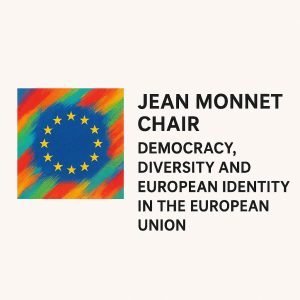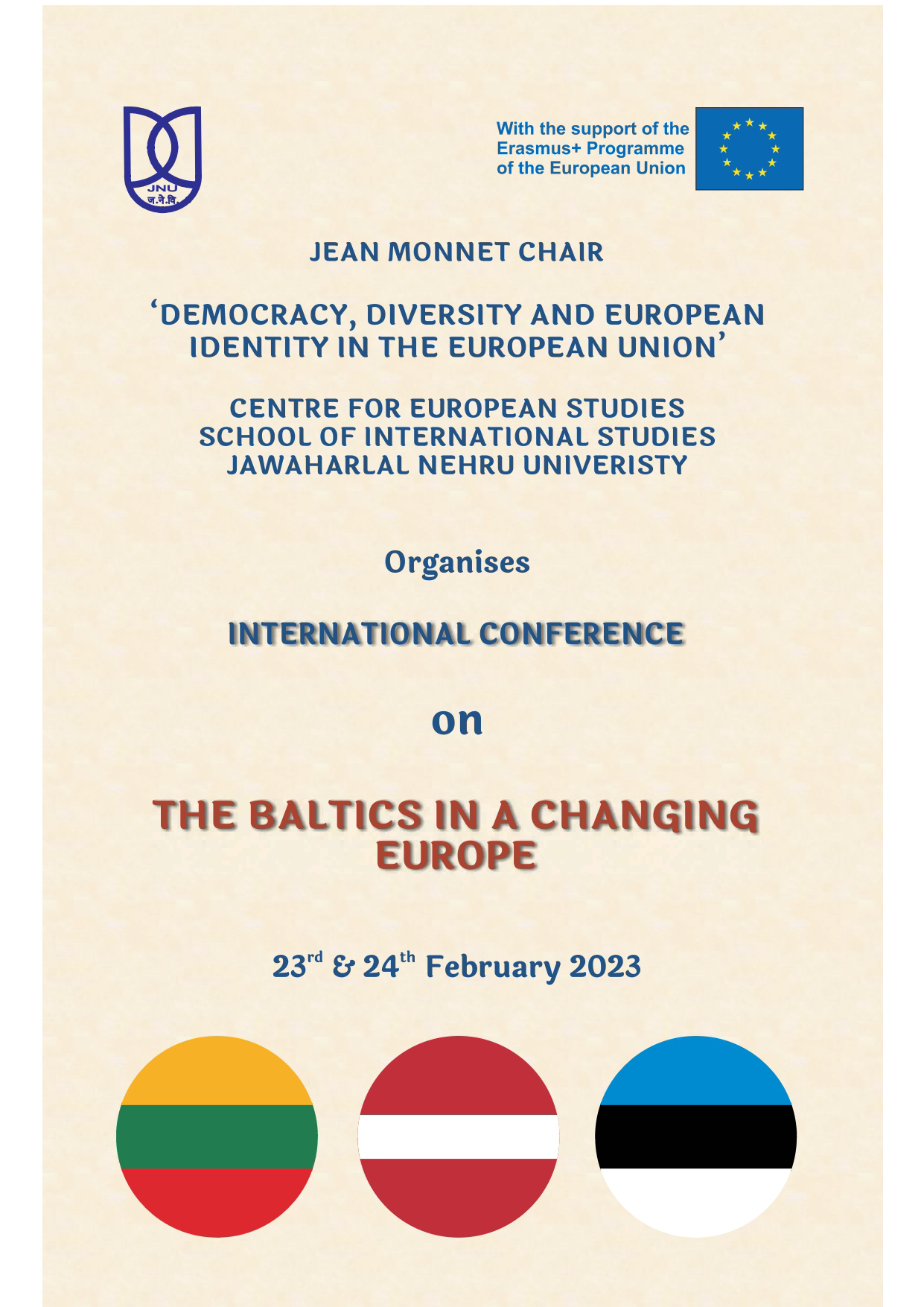
- This event has passed.
International Conference – “The Baltics in a Changing Europe” 23 & 24 Feb 2023

![]()


International Conference
The Baltics in a Changing Europe
23 & 24 February 2023
Organised by
Jean Monnet Chair on
‘Democracy, Diversity and European Identity in the European Union’
Centre for European Studies,
School of International Studies
Jawaharlal Nehru University
The Baltic States – Estonia, Latvia and Lithuania became independent sovereign states in 1991 following the disintegration of Soviet Union. These countries share common historical experience and geopolitical situation. Experience of Soviet occupation has played a vital role in shaping their foreign policies, bilateral relations and security policies. Since independence all three have been in search for security that, as the Latvian Foreign Policy Concept aptly put it would make “restored independence irreversible.” Thus they moved to rapidly distance themselves from Russia and integrate into the European political, social and security structures. Estonia, Latvia and Lithuania became members of the European Union (EU) in and the NATO in 2004 and of the Eurozone in 2011, 2014 & 2015 respectively.
The immediate challenge at independence was also to make a smooth transition to a functional market economy, establish a stable democracy by balancing the strong nationalistic sentiments of the majority communities with the demands of the huge number of Russian speaking population, and ensure security. After the initial hiccups from 2000 onwards, the three Baltic economies registered steady growth at an average of 8–9 percent a year. They, however, could not escape the 2008 financial crisis but steadied by 2012. Between 2011 to 2014 the three managed an average annual growth rate of 4.1 percent compared to only 0.7 percent for the EU as a whole. They continue to maintain steady economic growth, have developed as one of the leading hub in the field of Information Technology and have steadily improved living standards.
As EU members these states have been strong supporters of EU’s European Neighbourhood Policy and the Eastern Neighbourhood Policy. They are also part of numerous regional initiatives like – The Council of the Baltic Sea States; The Nordic-Baltic Region; EUSBSR, The Three Seas Initiative, HELCOM, Baltic Development Forum.
Indian on its part is looking at this region with interest. Indian Prime Minister in an interview in 2016 had stressed that the small countries of the world are not insignificant and need attention just like the big ones. A reflection of this understanding is seen in India-Baltic relations which are on the upswing following Vice President Venkaiah Naidu’s visit to the region in 2019. Our shared commitment to democracy, rule of law, and the promotion of peace and stability coupled with growing Baltic competence in niche technologies, digital innovation and governance and India’s stress on going digital are synergies that open up possibilities for future collaborations. During his visit the Vice President for instance invited Estonian companies to “take advantage of India’s flagship programmes like – Make in India, Digital India” and focus on technological partnerships in IT, cyber security and related domains. Given Estonia’s green energy development especially related to solar energy, India has invited Estonia to join the International Solar Alliance (ISA) to rapidly develop solar energy and enable technology transfer.
Given the development and future potential that these small states exhibit and the context of the current situation in Ukraine precipitated by Russian action, the Centre for European Studies is organising a two-day international conference in hybrid mode on “The Baltics in a Changing Europe”, 23 and 24 February 2023. The objective is to deliberate both the ground that these countries have covered since their independence to emerge as well functioning economies and polity and the challenges that they face.
We invite contributions for original papers from research scholars on the following broad themes but not restricted to it.
- History and Culture of the Baltic States
- Political Development – Democracy, Nation building, Minority Rights
- Economic and Technological Development, Environment and Climate Concerns
- Social Issues – Gender rights, Inequality
- European Union and the Baltics
- Foreign Policy and Security Concerns
- Intra and Inter Regional Co-operation
- India and the Baltics
Papers will be selected on the basis of a 250-300 words abstract to be submitted latest by January 20, 2023 to ceusconference2021@gmail.com. Decisions regarding the inclusion of proposed papers in the conference shall be mailed out by January 20 and the full papers need to be submitted by February 15, 2023. For any queries please reach out at ceusconference2021@gmail.com.
Event Report
The International Conference on the “The Baltics in a Changing Europe” was organised by the Jean Monnet Chair on “Democracy, Diversity and European Identity in the European Union”, Centre for European Studies in the School of International Studies (SIS), Jawaharlal Nehru University (JNU) on 23 & 24 February 2023.
Following the collapse of the Soviet Union, the Baltic States of Estonia, Latvia, and Lithuania regained independence in 1991 and were focused on becoming part of the political, social, and security systems of Europe. Their foreign policies, bilateral relations, and security policies have been moulded by their unique history and geopolitical environment. Despite early difficulties, they managed to maintain consistent economic development, establish themselves as industry leaders in information technology, and raise living standards.
Keeping in mind their increasing role in European and global politics, especially in the context of the ongoing war in Ukraine, the Centre for European Studies organised a two-day international conference in hybrid mode on “The Baltics in a Changing Europe”. The objective was to discuss both the progress made by these nations since gaining their independence in establishing well-functioning economies and polities as well as the difficulties they currently confront.
The International Conference witnessed presentations and commentaries from scholars and experts in Europe and India as part of planned thematic sessions that encompassed different aspects of the Baltic society. The event began with the Inaugural session chaired by Prof. Srikanth Kondapalli, Dean, School of International Studies, JNU. Prof Bhaswati Sarkar, Jean Monnet Chair and Chairperson at the Centre for European Studies gave the welcome remarks and shared a brief introduction to the Conference. This was followed by Keynote Address by Amb. Bhaswati Mukherjee, Former Ambassador of India to the Netherlands. In her speech, Amb. Mukherjee discussed India’s place in world affairs and remarked about the need to improve India-Baltic ties given the current situation. She underlined the need for solid democratic ties to promote ongoing cooperation and the exchange of ideas. Present in the session were H.E. Mr. Juris Bone, Latvian Ambassador to India, H.E. Diana Mickevičienė, Lithuanian Ambassador to India, and Mr. Margus Solnson, Deputy Head of Mission, Embassy of Estonia. Their special remarks on the conference theme set the tone for the working sessions. The session ended with a vote of thanks by the conference co-convener Dr. Akanksha, Assistant Professor, Sri Guru Gobind Singh College, Panjab University who thanked the dignitaries, guests, participants and attendees for joining the event.
The conference was divided into seven working sessions spread over two days and covered a wide range of topics, including foreign and energy policies, understanding Baltic politics and society, security challenges following the Ukraine War, and the prospects for India-Baltics relations in the long term. Around 30 participants presented on a topics which covered a wide range of issues like populism, the Pandemic, the political economy of the Baltics, exclusion and integration, and evolving dynamics within India-Baltic equations followed by Q&A and lively discussion. However, an important subject of debate throughout the two-day conference was the repercussions of the war in Ukraine and its political ramifications for the Baltic states. The working sessions were presided over by experienced members of the faculty who offered constructive feedback and remarks for each of the presentations. Prof. Gulshan Sachdeva, (Jean Monnet Chair & Professor, CES, SIS, JNU), Prof. Jayati Srivastava (Professor & Chairperson, Centre for International Politics, Organisation & Disarmament (CIPOD), SIS, JNU), Dr. Sakti Prasad Srichandan (Assistant Professor, CES, SIS, JNU), Dr. Teiborlang Kharsyntiew (Assistant Professor, CES, SIS, JNU), Prof. Sanjay Pandey (Professor, Centre for Russian and Central Asian Studies, SIS, JNU), Prof. Pierre- Frédéric Weber (Associate Professor, University of Szczecin, Poland), and Prof. Archana Upadhyay (Professor, Centre for Russian and Central Asian Studies, SIS, JNU) were the chairs of the seven working sessions.
The conference concluded with the Closing Session at the end of Day 2 where Prof Bhaswati Sarkar’s shared her final remarks to the participants and other attendees of the event. She stressed on the need to look at the various regional specificities in Europe for a better understanding of the European integration process and shared that a select number of papers presented in the conference would be part of a publication on the Baltics. Acknowledging the work behind organising International Conference in hybrid mode, she expressed her deep gratitude to the presenters, attendees and her student volunteers who helped in organising the event. On behalf of the students Ms. Sanskriti Rajkhowa, Research Scholar, CES, SIS, JNU addressed her vote of thanks for the event in which she expressed her sincere gratitude to the Centre for European Studies and School of International Studies for organising the event.
